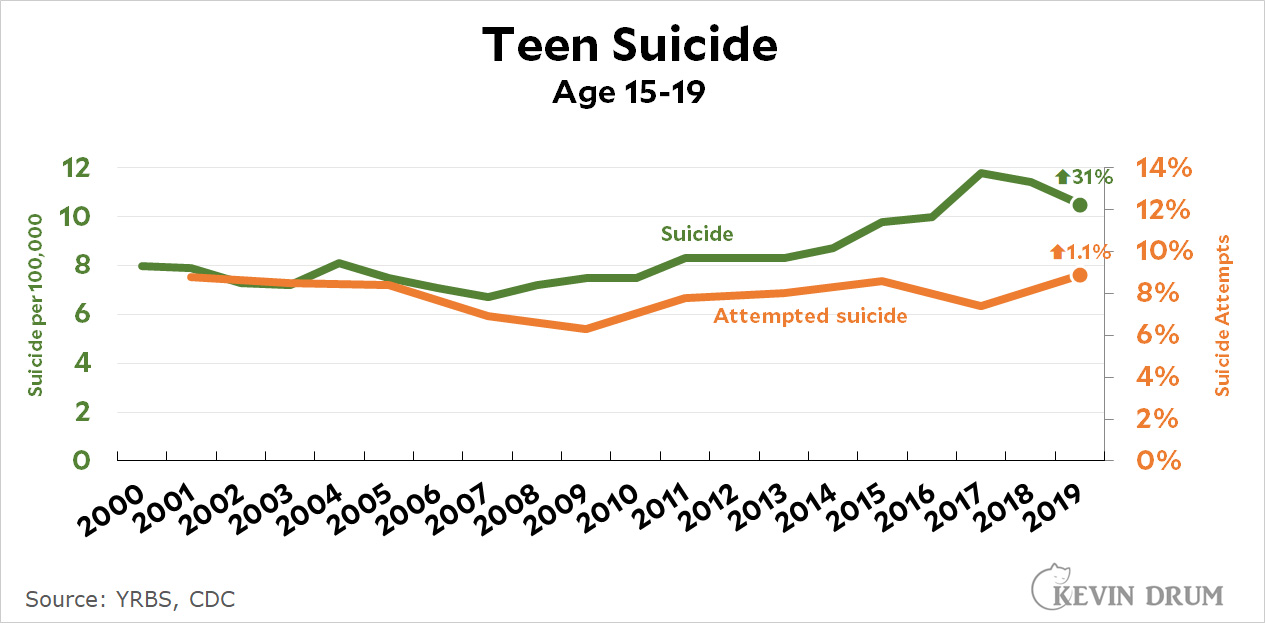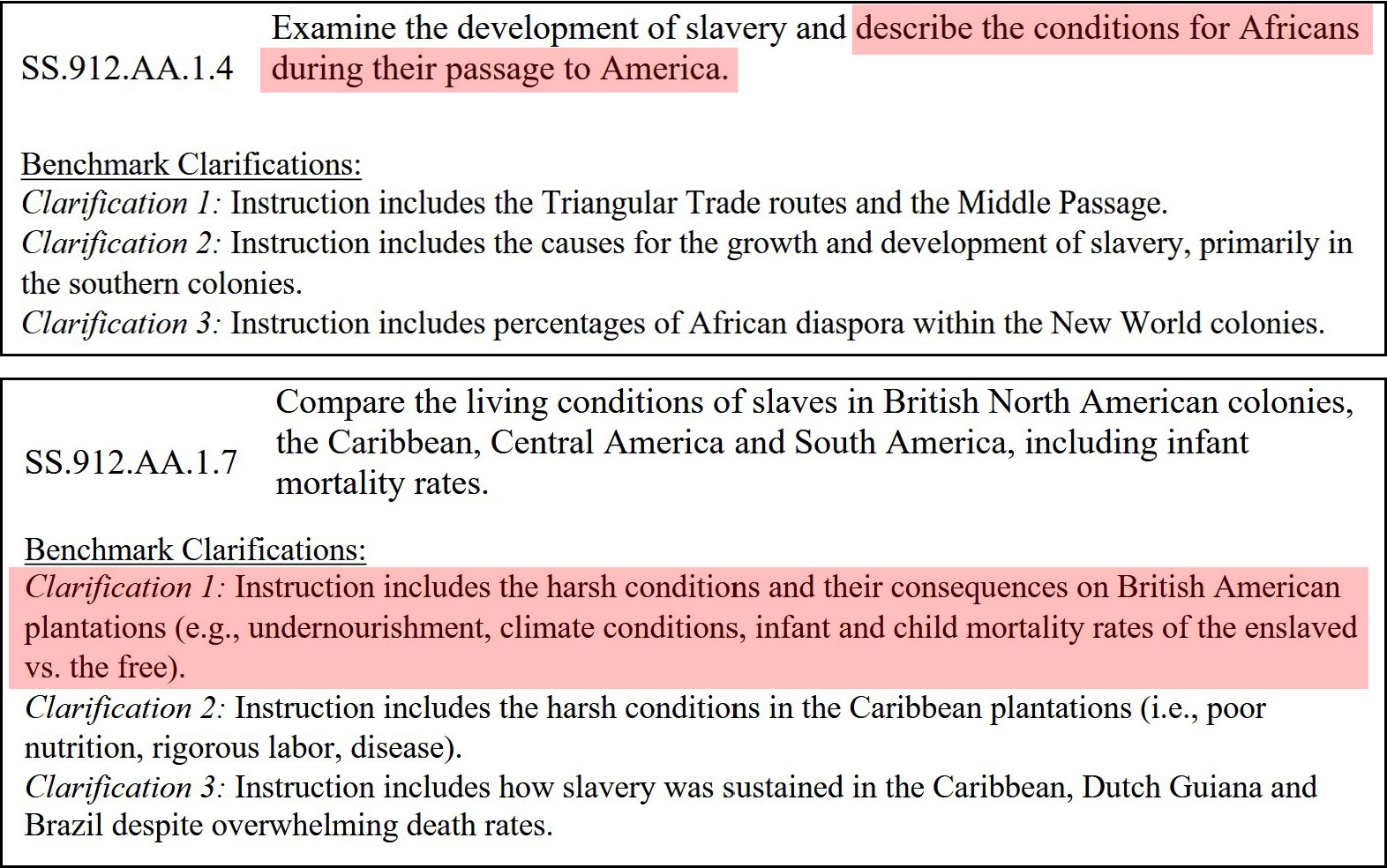This is not a streetlight in Paris glowing at night. It's a streetlight in Paris at dawn with the sun directly behind it. For some reason the illusion tickled me, so I snapped the shutter.

Cats, charts, and politics

World Weather Attribution, a group that does rapid estimates of weather events, has calculated the odds that our current heat wave would have happened with and without climate change. Their final synthesis is the purple bar at the bottom. For the southwestern US, climate change has made the heat wave 3,000-11,000 times more likely, with a middle estimate of 10,000 times:
Here is a mystery:
 Attempted suicide among teens has stayed the same since 2000, but the number of successful suicides has gone up by a third. Why? Are teens getting better at committing suicide?
Attempted suicide among teens has stayed the same since 2000, but the number of successful suicides has gone up by a third. Why? Are teens getting better at committing suicide?
Maybe it's a problem with the data? The numbers for attempted suicide come from a survey and they show that about 10% of all teens attempt suicide. Can that really be true? 10%?
POSTSCRIPT: Also worth noting is that if these numbers are correct then only about 1 in 1,000 teen suicide attempts is successful.
POSTSCRIPT 2: Suicide by firearm is far more successful than any other form of suicide, so one reason for the increase in successful suicides might be increased access to guns. However, the number of gun-owning households hasn't changed during the period when teen suicides rose:
 There is nonetheless some evidence that firearm suicide among teens has grown at a faster rate than non-firearm suicide. But we don't know why.
There is nonetheless some evidence that firearm suicide among teens has grown at a faster rate than non-firearm suicide. But we don't know why.
This almost makes me laugh more than it makes me outraged. In March Silicon Valley Bank suffered a huge run because it was in trouble and most of its deposits were uninsured. So what did the rest of the banking industry do?
Reduce their level of uninsured deposits? Ha ha. Of course not. They just said they did:
 Most of this bogus reporting happened at big banks that weren't in any danger of a run. So why did they do it? The Wall Street Journal tells us:
Most of this bogus reporting happened at big banks that weren't in any danger of a run. So why did they do it? The Wall Street Journal tells us:
Many of the banks that changed their numbers tried to include an unusual type of account in the category of deposits insured by the FDIC. [These accounts exceeded $250,000] but the banks put collateral behind them, effectively guaranteeing the depositors would be paid back if the bank failed.
....In May, the FDIC said it would impose a special assessment on banks with more than $5 billion of total assets to cover the $15.8 billion that it cost to guarantee uninsured deposits at Silicon Valley Bank and Signature Bank after they failed in March. The assessment would be based on a bank’s uninsured deposits as of Dec. 31.
So the banks were just trying to avoid the special assessment. It's coming on December 31, so there's no time to waste trying to fool the examiners!
Kevin McCarthy wants to pass a couple of spending bills sometime soon, but as usual he's having trouble with the far-right wing of his party. However, Rep. Chip Roy says he thinks things can be worked out:
McCarthy’s biggest hurdle in the funding debate is a bloc of House Freedom Caucus members who want even deeper reductions to the spending bills after already forcing the California Republican to slash far below the levels he agreed to with Biden last month.
....“At some point, we can figure those out a little bit on the fly,” added Roy, a prominent Freedom Caucus member. “We’re trying to work in good faith, again focused on the pre-Covid-level spending.”
I've got good news for Chip! All he cares about is domestic discretionary spending—welfare, foreign aid, welfare, green energy, and, of course, welfare—and it turns out the debt ceiling deal has already put us right on track to hit pre-COVID spending levels:
A new paper delivers the non-shocking news that rich kids have a way better chance of being admitted to super-elite universities than merely affluent kids even if their test scores are the same. This is due to a combination of legacy admissions, athlete preferences, and non-academic credentials, which provide elite universities with all the wiggle room they need to favor the rich:
 At super-elite universities, rich kids have double the attendance rate of the merely affluent. At selective colleges in general, rich kids have about 50% higher attendance rates. At public universities, they have no advantage at all.
At super-elite universities, rich kids have double the attendance rate of the merely affluent. At selective colleges in general, rich kids have about 50% higher attendance rates. At public universities, they have no advantage at all.
To my surprise, the paper also shows that this makes a significant difference:
 Using an index of positive outcomes (prestigious work, grad school, high income), the paper shows that kids who get into super-elite universities (green bars) do a lot better than they would have at prominent public schools like Berkeley and Northwestern (yellow bars).
Using an index of positive outcomes (prestigious work, grad school, high income), the paper shows that kids who get into super-elite universities (green bars) do a lot better than they would have at prominent public schools like Berkeley and Northwestern (yellow bars).
Finally, in an interesting aside, the authors show us who attends super-elite universities:
 Top of the list are Supreme Court justices, who are overwhelmingly graduates of elite universities. Next up are US senators and elite journalists.
Top of the list are Supreme Court justices, who are overwhelmingly graduates of elite universities. Next up are US senators and elite journalists.
Who's not on the list are rich people in general and Fortune 500 CEOs in particular. Here's where the top 20 CEOs went to school. Jeff Bezos is the only one who attended an Ivy League university.
 The moral of the story is that if you want to be rich, attend any college you want. But if you want to be elite, then (a) be born to rich parents and (b) attend an elite university.
The moral of the story is that if you want to be rich, attend any college you want. But if you want to be elite, then (a) be born to rich parents and (b) attend an elite university.
The state of Florida requires instruction in African American history in all grades, and as you might expect it's pretty thin in the primary grades. But it picks up a bit in middle school, with 14 separate standards mandated for grades 6-8. One of them is this:
 This footnote has caused an uproar in the lefty community, which seems a little overwrought to me. As a matter of historical record, it's true that slaves were occasionally allowed to earn money of their own by hiring out their services. This is hardly the biggest deal in the world.
This footnote has caused an uproar in the lefty community, which seems a little overwrought to me. As a matter of historical record, it's true that slaves were occasionally allowed to earn money of their own by hiring out their services. This is hardly the biggest deal in the world.
In fact, what really gets me is that it's not even the biggest deal in Florida's set of standards. Not by a long way. The real scandal of the Florida standards comes into focus only if you read the whole document. In the high school section, for example, instruction for the antebellum period includes 28 separate standards, of which more than a third (10 of 28) are related to abolition and other efforts to restrain slavery. Only two—if I'm counting generously—have anything to say about the conditions of slavery. Only one is about conditions in America itself, and it's deliberately phrased to make it seem like Southern plantations were not so bad, comparatively speaking:
 To read these standards as a whole, you'd think Black slaves were mostly a bunch of cobblers and blacksmiths, not cotton pickers, and early American history was largely a story of Quakers, abolitionists, and patriots working diligently to end slavery. Conversely, the appalling conditions of Black slavery are barely even acknowledged. There's mention of slave codes, but no mention of families broken up; brutal punishments meted out; women raped; slaves worked to death; rampant disease; miserable diets; and a life expectancy of 22. This isn't to say that individual teachers can't address these things, but for some reason there's no room to include them in the mandated standards.
To read these standards as a whole, you'd think Black slaves were mostly a bunch of cobblers and blacksmiths, not cotton pickers, and early American history was largely a story of Quakers, abolitionists, and patriots working diligently to end slavery. Conversely, the appalling conditions of Black slavery are barely even acknowledged. There's mention of slave codes, but no mention of families broken up; brutal punishments meted out; women raped; slaves worked to death; rampant disease; miserable diets; and a life expectancy of 22. This isn't to say that individual teachers can't address these things, but for some reason there's no room to include them in the mandated standards.
That's what's wrong with the Florida standards. The skills of slaves are just a sideshow.
The New York Times has a long piece today about the "steep cost" of Ron DeSantis's loose COVID policies, and it's a little hard to follow. But there's a simple way to judge the results of anyone's COVID policy: excess mortality. Here it is for Florida:
 Florida's excess mortality during the big Delta surge of late 2021 was way higher than the national average. Since then Florida has been right at the national average.
Florida's excess mortality during the big Delta surge of late 2021 was way higher than the national average. Since then Florida has been right at the national average.
Those are the facts. Interpretation is up to you. We can certainly say that Florida isn't a success story, but aside from the Delta catastrophe it's not a failure either. I'd call it mostly average.